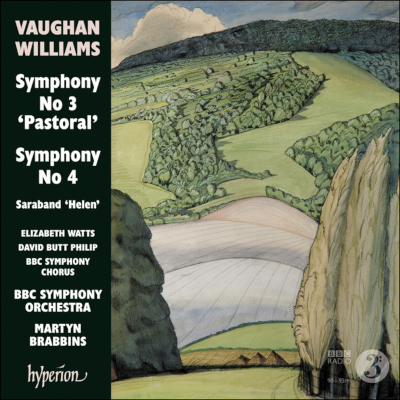Following on from A Sea Symphony (read more here) and A London Symphony, this series is proving to be a major contribution to the discography. Vivid, thought-through performances, immensely rewarding.
In this Vaughan Williams Symphony no 3, the introduction to the Molto moderato seems to vibrate as if from within. Deliberately ambiguous textures, constantly shifting and unsettled. Despite the poignant violin, (which might suggest The Lark Ascending) this is not complacent. As Vaughan Williams himself wrote, “It’s really wartime music – a great deal of it incubated when I used to go up night after night in the ambulance wagon at Ecoivres and we went up a steep hill and there was wonderful Corot-like landscape in the sunset. It’s not really lambkins frisking at all, as most people take for granted.” The oboe and cor anglais intensify the irony, for these instruments remind us what the fields of France might have been before they became battlegrounds.
The horn solo with which the Lento movement begins further reinforces the battlefield connotations, at once a reveille and and Last Taps. Gradually lines stretch forward, but the landscape is still haunted by the ambiguities of the first movement, the panorama seen, as it were behind smoke and rain. The trumpet cadenza, played without valves sounds deliberately hollow, as if blown not quite in tune by an ordinary foot soldier: too much polish would not work. Yet more irony, since it takes considerable skill on the part of a trained professional to achieve such results. The high, ascendant tessitura suggests gradual change of perspective, upwards into another realm. Does the trumpet here foretell the Last Trumpet at the End of Time? In the third movement, bright figures suggest freedom. They introduce the vigorous, earthy dances of the scherzo, which may or may not signify the music of earlier times with which Vaughan Williams was so familiar. But are these dances bucolic or brutalist? This symphony operates on many different levels.
In the final movement, Vaughan Williams employs a human voice, (Elizabeth Watts) albeit one singing ethereal wordless vocalize. If the trumpet at the end of the second movement signifies the Last Trumpet, the voice here might signify angels, but not necessarily. Perhaps it’s a reminder that some things are beyond human comprehension and may never be bridged. Elizabeth Watts’ timbre is pure and unworldly, with just enough warmth to suggest some tantalizing form of comfort. Her voice echoes from afar, for distance matters: there is a dividing line between this world and whatever may or may not lie ahead. The re-entry of the orchestra brings us back to earth. There are echoes of the dances in the scherzo, of the high string tessituras and wind instruments, now embellished by harp and celeste. The expansive, searching lines now rise with greater fullness than before, yet recede into near silence. The voice continues, alone.
Of his Symphony no 4 in F minor, Vaughan Williams told Sir Henry Wood, “I don’t like the work itself much, but it is undoubtedly a very fine piece”. Good music “exists” by its own creative volition: it’s not manufactured to preconceived specifications like a consumer product. As the composer was later to write “I do think it beautiful...because we know that beauty can come from unbeautiful things”.
Brabbins shapes the introduction so it seems to explode with fierce but controlled force. Although this fanfare might seem shocking, it does connect to other aspects of the composer’s work. At times I was reminded of the figure in the Antiphon in Five Mystical Songs “The Church with psalms must shout.... My God and King “. Vaughan Williams, who knew the Bible and Messianic traditions, understood the concept of forces so powerful that they cannot be constrained. Pounding ostinato, trumpets (again, Biblical significance) ablaze, trombones and tuba add depth. The theme isn’t meant to be soothing. It could reflect the “terrible beauty” from the Book of Job Ch 37, 17-22, though there is nothing religious about this symphony. The references merely serve to indicate that a cataclysm of some sort is being unleashed.
More brass in the second movement, marked andante moderato, but this time more restrained, the strings of the BBCSO murmuring en masse, from which the woodwind line rises, moving ever upwards. A sense of unease: tense pizzicato creating a fragile though regular beat. The flute melody, exquisitely played, has a poignant quality: painfully alone but unbowed. Wildness returns with the third movement, brass pounding, trombones creating long zig-zag lines. For a moment the tuba leads a trio with grunting bassoons. The term “scherzo” means “joke” but the humour here is darkly ironic. This colours the sprightly theme which follows: it’s not escapist. The swaggering thrust of the first movement returns, angular dissonances flying in all directions, clod-hopping ostinato suggesting grotesque horror. The Finale is “con epilogo fugato” : no easy resolution, no easy answers. Given Brabbins’ grounding in modern and modern British music, his approach to this symphony is particularly interesting, full of insight and freedom. intuitively executed.
The bonus on this recording is the premiere of Saraband, taken by Brabbins from an unpublished manuscript. This brief cantata, for voice, chorus and orchestra, with David Butt-Philip as soloist, sets lines from Christopher Marlowe’s Doctor Faustus, describing Helen of Troy. Drafted in 1913-14, but not completed, the work was set aside by other pressures of work. Even in embryo, it’s an interesting work which bears the mark of the composer at this fertile stage in his career.
Anne Ozorio
